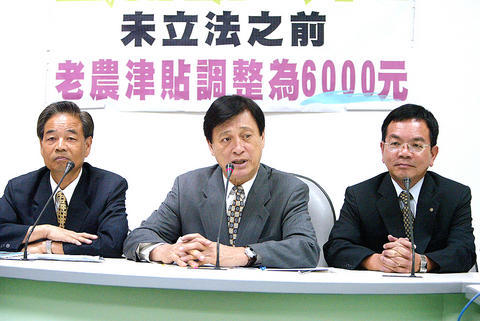Defying the Cabinet's stance on the issue, a group of Democratic Progressive Party (DPP) lawmakers yesterday proposed raising the monthly subsidy for elderly farmers.
The proposal, which calls for the subsidy to be increased by NT$1,000, was put forward by DPP caucus whip Wang Sing-nan (
When fielding questions on the legislative floor yesterday, Premier Su Tseng-chang (

PHOTO: CNA
"We will deliberate how to take care of underprivileged people should the bill to establish a national pension system fail to clear the legislature before July," Su said.
He restated his opposition to subsidy increases when answering questions from Chinese Nationalist Party (KMT) Legislator Sun Ta-chien (
"The proposed amendment [calling for a subsidy increase] needs approval from the DPP caucus meeting [on Friday] if Wang Sing-nan wants to put it in the caucus' name," Su said.
Last Thursday, President Chen Shui-bian (
"I must say, the president never `asked' us to [increase the farmers' subsidy]. He `hopes' that we will do so," Su said yesterday. "In addition, the pension system as a whole should be our focus rather than any specific part of it, and the farmers' subsidy is supposed to be a part of that system."
At his press conference yesterday, Wang also lashed out at Vice Premier Tsai Ing-wen (
"Tsai doesn't understand the president's instructions at all," Wang said.
In her defense, Tsai, in a separate setting, said: "I was just kidding. I will pay my taxes on time."
However, Tsai did say that increasing the farmers' subsidy would significantly increase the government's debt and that she was against the proposal.
Meanwhile, DPP Legislator Wang Jung-chang (
Wang Jung-chang expressed concern that a plan to increase the subsidy would use money earmarked for underprivileged people.
"The government must impose a stock exchange tax -- which could generate NT$150 billion a year -- if it wants to increase the subsidy for elderly farmers. Otherwise, the elderly will suffer," he said.
The Cabinet is supposed to present its proposed national pension law to the legislature today after deliberation at the weekly Cabinet meeting.

A preclearance service to facilitate entry for people traveling to select airports in Japan would be available from Thursday next week to Feb. 25 at Taiwan Taoyuan International Airport, Taoyuan International Airport Corp (TIAC) said on Tuesday. The service was first made available to Taiwanese travelers throughout the winter vacation of 2024 and during the Lunar New Year holiday. In addition to flights to the Japanese cities of Hakodate, Asahikawa, Akita, Sendai, Niigata, Okayama, Takamatsu, Kumamoto and Kagoshima, the service would be available to travelers to Kobe and Oita. The service can be accessed by passengers of 15 flight routes operated by

Alain Robert, known as the "French Spider-Man," praised Alex Honnold as exceptionally well-prepared after the US climber completed a free solo ascent of Taipei 101 yesterday. Robert said Honnold's ascent of the 508m-tall skyscraper in just more than one-and-a-half hours without using safety ropes or equipment was a remarkable achievement. "This is my life," he said in an interview conducted in French, adding that he liked the feeling of being "on the edge of danger." The 63-year-old Frenchman climbed Taipei 101 using ropes in December 2004, taking about four hours to reach the top. On a one-to-10 scale of difficulty, Robert said Taipei 101

Taiwanese and US defense groups are collaborating to introduce deployable, semi-autonomous manufacturing systems for drones and components in a boost to the nation’s supply chain resilience. Taiwan’s G-Tech Optroelectronics Corp subsidiary GTOC and the US’ Aerkomm Inc on Friday announced an agreement with fellow US-based Firestorm Lab to adopt the latter’s xCell, a technology featuring 3D printers fitted in 6.1m container units. The systems enable aerial platforms and parts to be produced in high volumes from dispersed nodes capable of rapid redeployment, to minimize the risk of enemy strikes and to meet field requirements, they said. Firestorm chief technology officer Ian Muceus said

MORE FALL: An investigation into one of Xi’s key cronies, part of a broader ‘anti-corruption’ drive, indicates that he might have a deep distrust in the military, an expert said China’s latest military purge underscores systemic risks in its shift from collective leadership to sole rule under Chinese President Xi Jinping (習近平), and could disrupt its chain of command and military capabilities, a national security official said yesterday. If decisionmaking within the Chinese Communist Party has become “irrational” under one-man rule, the Taiwan Strait and the regional situation must be approached with extreme caution, given unforeseen risks, they added. The anonymous official made the remarks as China’s Central Military Commission Vice Chairman Zhang Youxia (張又俠) and Joint Staff Department Chief of Staff Liu Zhenli (劉振立) were reportedly being investigated for suspected “serious